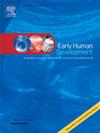Effectiveness of an oral-motor intervention for premature infants: Feeding and maternal self-efficacy
IF 2
3区 医学
Q2 OBSTETRICS & GYNECOLOGY
引用次数: 0
Abstract
Objective
This pilot study examines the effects of a non-invasive mother-administered oral motor stimulation intervention incorporating maternal breast milk, on feeding quality, and maternal self-efficacy, which has not previously been examined.
Background
Preterm infants are at risk of feeding difficulties, and while oral motor interventions have demonstrated efficacy, few have examined outcomes related to parental self-efficacy.
Methods
In a controlled prospective pilot study, 46 preterm infants were randomly assigned to intervention (n = 26) or control (n = 20) groups. The intervention group received an oral-motor stimulation program using breast milk, which involved mothers performing external oral stimulation followed by non-nutritive sucking with breast milk for 10 min, twice a day, over a 10-day period. The control group received routine care.
Results
Intervention group showed significantly improved oral feeding quality as measured by the Infant-Driven Feeding Scales (IDFS). No significant group differences were observed in days to full oral feeding or hospital stay length. Maternal parenting self-efficacy increased significantly over time for both groups, with no significant group differences. Intervention's feasibility showed through intervention group mothers' reports that it is an applicable treatment, contributes to strengthening mother-infant bond, maternal sense of self-efficacy in the general care of their preterm infants, particularly in feeding them
Conclusions
Non-invasive oral motor stimulation using breast milk promotes oral feeding quality in preterm infants.
Implications
Implementation of this intervention by mothers, at early hospitalization stages, may strengthen maternal self-efficacy, especially in acquiring feeding skills.
早产儿口腔运动干预的有效性:喂养和母亲自我效能
目的:本初步研究探讨了一种非侵入性的母亲口服运动刺激干预,包括母乳,对喂养质量和母亲自我效能的影响,这在以前没有被研究过。背景:早产儿存在喂养困难的风险,虽然口腔运动干预已经证明有效,但很少有人研究与父母自我效能相关的结果。方法采用前瞻性对照试验,将46例早产儿随机分为干预组(n = 26)和对照组(n = 20)。干预组接受了使用母乳的口腔运动刺激计划,该计划包括母亲进行外部口腔刺激,然后用母乳吮吸10分钟,每天两次,为期10天。对照组接受常规护理。结果干预组经婴儿驱动喂养量表(Infant-Driven feeding Scales, IDFS)测定,口服喂养质量有明显改善。在完全口服喂养的天数或住院时间方面,组间无显著差异。随着时间的推移,两组母亲的自我效能感都显著增加,但没有显著的组间差异。干预的可行性通过干预组母亲的报告表明,干预是一种适用的治疗方法,有助于加强母婴关系,增强母亲对早产儿的一般护理,特别是喂养的自我效能感。结论母乳无创口腔运动刺激可提高早产儿的口服喂养质量。意义母亲在住院早期实施这种干预可以增强母亲的自我效能感,特别是在获得喂养技能方面。
本文章由计算机程序翻译,如有差异,请以英文原文为准。
求助全文
约1分钟内获得全文
求助全文
来源期刊

Early human development
医学-妇产科学
CiteScore
4.40
自引率
4.00%
发文量
100
审稿时长
46 days
期刊介绍:
Established as an authoritative, highly cited voice on early human development, Early Human Development provides a unique opportunity for researchers and clinicians to bridge the communication gap between disciplines. Creating a forum for the productive exchange of ideas concerning early human growth and development, the journal publishes original research and clinical papers with particular emphasis on the continuum between fetal life and the perinatal period; aspects of postnatal growth influenced by early events; and the safeguarding of the quality of human survival.
The first comprehensive and interdisciplinary journal in this area of growing importance, Early Human Development offers pertinent contributions to the following subject areas:
Fetology; perinatology; pediatrics; growth and development; obstetrics; reproduction and fertility; epidemiology; behavioural sciences; nutrition and metabolism; teratology; neurology; brain biology; developmental psychology and screening.
 求助内容:
求助内容: 应助结果提醒方式:
应助结果提醒方式:


